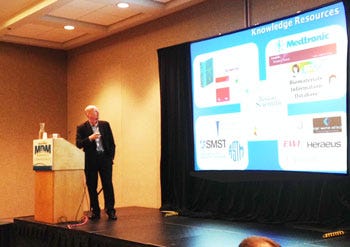October 28, 2013
Lack of materials knowledge is an issue among medical device startups, and it is going to hurt them down the road, says Mark Breyen, senior director of core technologies at Medtronic.
"They're just making simple choices on materials, often because they're just trying to start up. They don't have the bandwidth to really explore and go deep like we do. And then they don't have a lot of downside. ... When your revenue's zero, what do you have to lose?" Breyen said Monday during a talk on determining implantable medical device materials at the MD&M Minneapolis held October 28-30.
Breyen thinks Medtronic will help startups more as it makes more investments in such companies, allowing it to share detailed research and validation processes.
|
Significant numbers of medical device materials experts are retiring, says Medtronic's Mark Breyen. |
"The little guys need to be talking to the big guys," Breyen says. "I would advise people to go to existing [medical device company] suppliers," Breyen adds.
Breyen also noted that many of the pioneers in the medical device materials field are retiring, and are a go-to source of information. "What scares me is all the Medtronic people I don't lock down," Breyen says.
Those who question whether this is important should look no further than the story of the now-defunct French medical device manufacturer Poly Implant Prothèse (PIP), which. for about 10 years, made and sold faulty breast implants made from industrial-grade silicone. The silicone used in these breast implants was of questionable safety, threatening the health of an estimated 400,000 women, and helped spark changes in the way the European Union approves medical devices.
Breyen shared a number of insights on investigating the safety and usefulness of medical device materials:
Materials researchers spend much of their time breaking things and figuring out why it happened. Medtronic has set down detailed processes for such investigating, and pushes its suppliers to use them, Breyen says.
Legacy materials are often relied on in the medical device industry because they have a track record, and should hopefully provide fewer hurdles in the regulatory approval process. "You don't change things if you don't have to. If you want to get your product quickly to market," Breyen says.
Medtronic itself has its own internal forum on material sciences that helps Breyen quickly look up colleagues with expertise. "We need more tools like that in our industry," he says.
Breyen's father, who was a production manager at Honeywell, also taught him the importance of getting down to the production lines and talking with the people who are processing the materials. "Engineers in the medical device industry who haven't seen titanium melted down need to go see it--not only because you need to see how that process works in person but also because you need to meet the people who do it," Breyen says.
Don't underestimate the importance of understanding the first principles, the fundamental physics of the materials. "Why does the polyurethane degrade? Why does the silicone swell?" Breyen says. If there aren't people in-house who understand it, tap into the universities, he advises. Breyen thinks the companies that are the most successful with materials are the ones who understand such fundamentals and then take them to the next level.
More cooperation between medical device companies is needed, and Breyen thinks some of the need is taking care of itself as people move between companies.
"We can afford less and less to do our materials development on our own, and we're going to have to work together as an industry," Breyen says.
Chris Newmarker is senior editor of MPMN and Qmed. Follow him on Twitter at @newmarker.
About the Author(s)
You May Also Like



